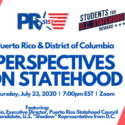George Laws Garcia and Oye Owolewa will be joining on Zoom for a discussion of statehood for Puerto Rico and for the District of Columbia. The event will take place on Thursday at 7:00 p.m. eastern time.
George Laws Garcia is the Executive Director for the Puerto Rico Statehood Council. Oye Owolewa is he Democratic nominee for the “shadow” congressional representative for Washington, D.C.
The Howard University chapter of Students for D.C. Statehood is hosting the event.
Aspiring to statehood
Both Puerto Rico and D.C. are possessions of the United States aspiring to statehood. Puerto Rico has been a territory of the United States for more than a century, and the people of Puerto Rico have been U.S. citizens since 1917 — also more than a century. As a territory, Puerto Rico has just one non-voting member in Congress, and no participation in presidential elections.
Washington, D.C., has the ability to vote in presidential elections, but like Puerto Rico has no senators and just one non-voting member in Congress.
The congressional representatives speak for their constituents. They are allowed to introduce bills and to serve as voting members of committees.
However, when the entire House votes, things get more complicated.
The representatives for D.C., Puerto Rico, and the other territories are allowed to vote. However, if their votes make a difference, the vote must be taken again, without allowing them to vote.
For example, if the recent vote on statehood for D.C. in the House passed by a considerable margin. If it had passed by just one vote, however, the vote would have been repeated without any input from the representative for D.C.
In the previous Congress, these representatives were not allowed to vote at all, not even with the symbolic courtesy that they now receive.
D.C. statehood movement
Washington, D.C., has more residents than two states: Wyoming and Vermont. The workers there pay federal income taxes. They are U.S. citizens.
But they have only the same limited representation in Congress that Puerto Rico and the other territories have. Congress has final say on their laws, and can veto decisions the residents make. Many D.C. statehood bills have been introduced. The House voted on one in 1993, but that bill lost the vote.
The latest D.C. statehood bill would create the state of Washington, Douglass Commonwealth, named after human rights activist Frederick Douglass. The new state would have two senators, as all states do, and one representative in the House. D.C. currently elects a “shadow” representative. Oye Owolewa is standing for this position.
D.C.’s voters have a tendency to vote Democratic. In the most recent presidential election, the city voted 89% Democratic. Republicans in the Senate shamelessly admit that this is a reason they don’t want D.C. to become a state: it would probably send two Democratic senators into the Senate, which is currently controlled by Republicans.
The idea that any group could refuse to admit a member on the basis of their political party may be shocking, but they are not shy about about it.
Puerto Rico statehood movement
Like D.C., Puerto Rico has introduced many statehood bills over the years. None has yet been voted on in Congress.
Puerto Rico cannot participate in presidential elections and does not have full representation in the legislature. As a state, Puerto Rico would have five Members of the House and two senators.
Many members of Congress believe that Puerto Rico would vote Democratic just as D.C. does, and oppose statehood for that reason. In fact, there is no reason to expect that Puerto Rico would be a blue state.
José Celso Barbosa, born in 1857, is considered the father of the Puerto Rico statehood movement. The Democratic Party Platform of 1940 called for statehood for Puerto Rico as well as Hawaii and Alaska.
The statehood movement is not new.
But there is a new level of commitment to statehood among the new generation of Puerto Rican voters.
Join the Students for D.C. Statehood and the representatives of these two statehood movements tomorrow night to learn more.








2 Responses
Washington, DC– is under a different Constitutional Article that forms the Capitol of the US on non-State Grounds. The land was taken from Virginia and Maryland… which the US Citizens in WDC could be allocated for the purposes of Representation…
The US Territory of Puerto Rico (with millions of US Citizens; more than 22 States) is under the Constitutional Territorial Clause, under the will of US Congress….
Statehood for WDC could require a Constitutional Amendment; but, not for Puerto Rico which the US Congress can grant Statehood, now. Thus, each issue is different; should not be tied together!
Agree with Dennis Freytes comments. Certainly , supporting each other in their Statehood aspirations is fine, but going beyond that is a huge tactical error. This is not a good strategy for PR 51. Nor is it a good strategy for PR 51 to advocate or express wide support to some other National liberal, radical issues.
Politically – DC is liberal and democratic. If they ever become a State , they would be a definitive democratic State. Republicans in congress will never allow that to happen.
When Democrats where in power with a clear majority – they did nothing to advanced PR Statehood.
PR. Will not have a chance politically for Statehood unless -there is a strong, true conservative Republican voice in the island and a chance for PR to either be a Republican red state or at the very least, a swing State. This is just from the USA congress politically perspective. It is a necessity for island residents to become knowledgeable in The mainland political structure and understand at the core what the two main political parties ( Democrats and Republicans) stand for.
The current and past events in the island are a major red flag for congress- as they should be! We shall see what happens in PR with the upcoming primaries and general election.